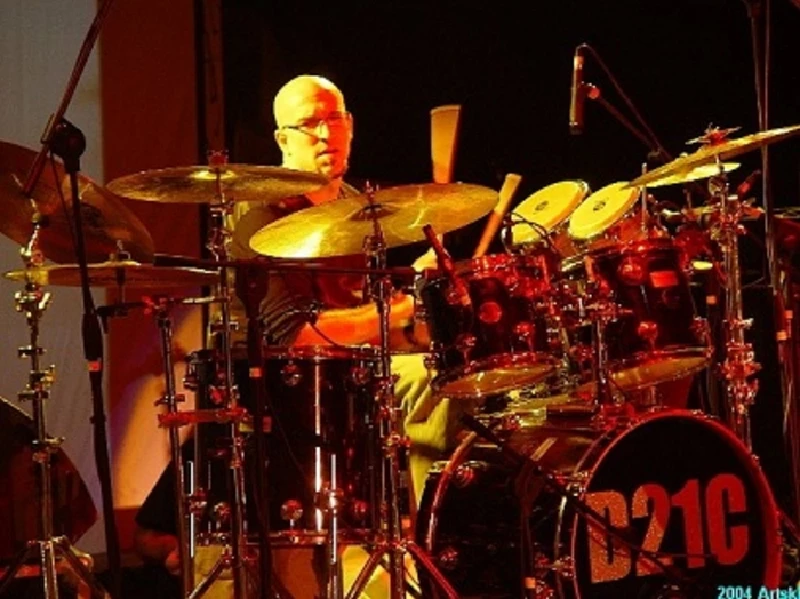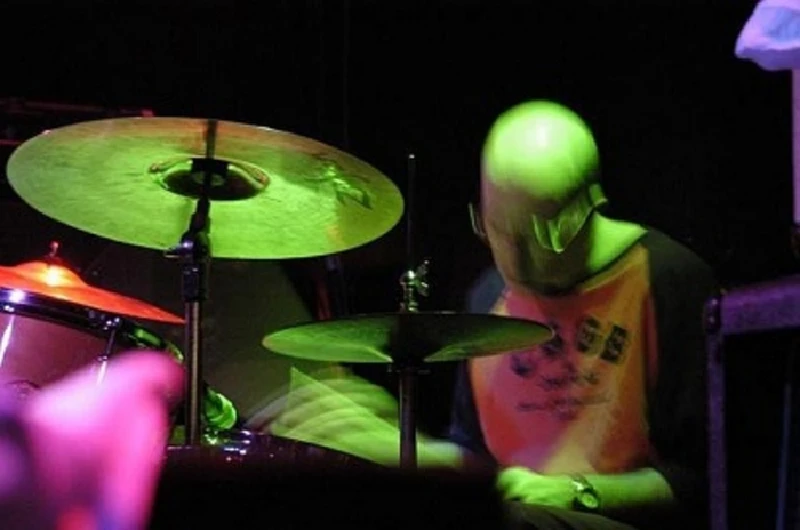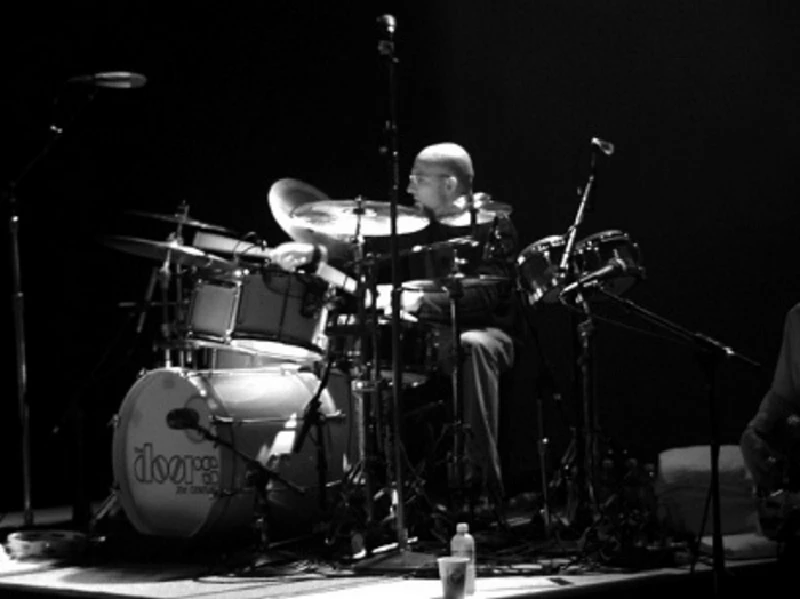Ty Dennis - Interview
by Lisa Torem
published: 21 / 2 / 2011

intro
Drummer and session player Ty Dennis chats to Lisa Torem about becoming Stewart Copeland's permanent replacement in Doors' offshoot the Doors of the 21st Century and his major musical influences
He’s an L.A. man blissfully pounding out a spirited back beat to ‘L.A. Woman’ but it took tons of work to get to that point. Ty Dennis, originally a session musician on the west coast, became proficient in many musical styles before he joined the Robby Krieger Band in 2001. Then, the drummer temporarily replaced percussionist Stewart Copeland, who had broken his arm, and ultimately became the permanent member of 'The Doors of the 21st Century’ with long-time members, guitarist Robby Krieger and organist Ray Manzarek. The latter refers to Dennis as “one very hot drummer”, while Krieger calls his colleague, “Mr. Solid.” Dennis spends his time providing percussive tracks for recording projects, giving lessons, contributing to side projects, nurturing his wife and kids and, of course, touring with the legendary musicians that are keeping alive some of the most distinctive rock-fusion arrangements created during the golden ‘60s and ‘70s. To play drums with the band that propelled Jim Morrison to fame requires an incredible sense of timing and flexibility; Dennis credits his colleagues from the past for his success in the band, yet still acknowledges the unique gifts each member contributes. I met Ty last November at the Rock 'n' Roll Fantasy Camp in November at which time he poured his heart into mentoring a group of newly-formed musicians who would need to perform three songs the next evening. Maybe the experience brought him back to his days as the impressionable son of a jazz drummer; he took his role quite seriously - his fledgling group nailed it that night. PB: Ty, you had performed with Rob Krieger’s solo act before joining Rob and Ray Manzarek in the ‘Doors of the 21st Century/Riders on the Storm’ project. Did you feel the Doors legacy in greater depth after you made that switch? TD: Definitely. Once I had the opportunity to play the music with both Robby and Ray, that is when I got a taste of the magic of what makes them one of a kind. A great memory for me is playing ‘Riders on The Storm’ for the first time with Ray and supporting him under the famous solo he does on that tune. It is an honour to share the stage with them! PB: Did you feel compelled to either reproduce the style of John Densmore or Stewart Copeland or to veer in a different musical direction than the previous drummers in the band? TD: Excellent question! It's difficult not to "borrow" a lot of the signature things John played. You do have to do the songs justice and respect the legacy of the Doors music...play the right parts. Those drum parts are there for a reason. There are certain drum fills that are part of those songs' personality. It's kind of like an actor in a play. Whoever is playing that part works off the same script, but within that you do get to be you and add your personality. Stewart Copeland was and is a major influence on me, so his influence comes across in my playing with whomever I happen to be playing drums with. To answer your question, I don't feel compelled, no. Even though I incorporate John's parts and Mr. Copeland's inspiration, I was hired because I play this gig like me. I am definitely not cloning anyone. PB: Does performing with Ray Manzarek and Rob Krieger allow you more freedom of expression than you might find in the traditional rock band, due to the jazz and even Latin influence that is so prevalent in their repertoire? TD: For sure, yes. There is an improvisational and even experimental element to playing this music. Things don't have to be played the same exact way every time which makes it all the more fun to play! To get an understanding of where Ray and Robby come from as musicians I think you need to have been exposed to some jazz records along the way along with, of course, the blues. PB: The band has performed with Ian Astbury and Miljenko Matijevic as front men. Which singer do you feel demonstrates more of the sound the fans want? TD: I would say Ian because he is so influenced by the Doors and Jim Morrison and always brought that respect to his performances. He was able to draw on his connection to the music and bring that to his performances. He just really "got it". PB: It’s interesting in that you were born in 1971 which was the year that Jim Morrison died. Were you a fan of the Doors when you were growing up and do you feel in a sense that you’ve come to know him since being part of the band? TD: Honestly, I was not a fan of the Doors especially. I wasn't familiar with much of their catalogue other than the radio hits. Now when I started working with Robby, I dove into all their records and especially the live recordings. That is when I became a fan. To me, playing live is where the magic happened with that band; it is the same thing with Led Zeppelin. It is interesting that I was born the same year Jim Morrison died...do I feel a connection?? I wouldn't say so, no. I have heard a lot of stories and descriptions of him from being around Robby and Ray, so in that sense I do get an impression of what he was like for real - not just what is written or sensationalized. PB: Ty, your father was a jazz drummer. How much did he influence your career? When did you feel that drums would be your major instrument and how did you learn to play? TD: Well, I was exposed to drums at my house from my earliest memories. That exposure and also all the cool records I grew up hearing being played at home, for sure influenced my career choice. I like and appreciate different kinds of music, so that has lead to working with a diverse group of artists over the years. I did have my father to guide me in the right direction when I asked for it. I just always gravitated towards drumming, and when I was 13 or 14 I knew that was what I was going to do with my life and started taking it a lot more seriously. PB: You list Herbie Hancock as a major influence. He was known for a composition entitled, ‘Rockit.’ This composition lauded the 80s “scratch sound.” Was it that phenomenon that attracted you to his music or his other works? TD: Yeah, he is probably my favourite musician. He has many different eras in music starting with his time working with Miles Davis all the way up to today where he is still relevant!! But his records that I really love are the 70's era fusion/funk albums. Starting with the record ‘The Headhunters’ and the song 'Chameleon' that is a jazz standard now. He did several records like that, my favorite being titled ‘Thrust.’ Lots of improvisation, genius composition, and the genius of Herbie! That song "Rockit" is killer though, and it is essentially an instrumental and was a big mainstream hit. Who else could do that?? PB: At Chicago’s first Rock and Roll Fantasy Camp you mentored a young band who had never written or performed together. You chose to spend a great deal of time with them, even outside of the rehearsal room, even though you could have networked with other artists. Was this a meaningful experience for you? What do you think or hope those musicians gleaned from your time together? TD: Yeah, it was a really good time. I met some super nice, lovely people there. I have got to say when I started working at the R&R fantasy camp another counselor there, Rudy Sarzo, told me his philosophy of "just make this experience about them.” That stuck with me. I had a blast doing my best to inspire my new friends in my band there to really get the most out of the experience. Some of them had never played on stage before so you have to help get them over their nerves. For that weekend in Chicago we were a band, so, yeah, we all had the same goal. The first thing I said to my band after I met them was that, regardless of each person's level of experience or ability, we were going to be our little version of the Three Musketeers or in that case actually the Five Musketeers. "All for one and one for all!" No bad vibes or making faces behind anybody else's back. Respect all the way around. It was great learning our songs, having fun, hanging out at lunch, and then doing the show! It all went great. PB: You also have a young son. Does he demonstrate an interest in music? Will he continue the family tradition? Did your outlook on life change once you became a father? TD: My son has a great music ear for sure. He's only four so who knows what he'll gravitate towards. Like everyone says, having kids puts everything else in perspective. I have a one and a half year old daughter too. So life is good! Whatever my kids end up doing is fine by me. The music business is definitely not for everybody. PB: You’ve worked with other bands in LA, such as a group called Firebug and you contributed to an instrumental work with Travis Dickerson, guitarist Buckethead and Jethro Tull drummer, Doane Perry. Can you describe your role in both of those projects? TD: The band Firebug I have worked with off and on since 2000. We've recorded five or six records and played shows all over from Chicago and New York to Canada, and most recently England. This past December we just finished tracks for a new release with the great producer Chris Goss who produced the Cult and Artic Monkeys among others and has his own band Masters of Reality. They are a g reat band and Juliet is a tremendous singer. The instrumental project you're referring to was a recording session I was hired to work on here in Los Angeles. I was one of the drummers on it along with Doane Perry and, yes, Buckethead on guitar. PB: What makes an extraordinary drummer and who fits this description? TD: To me, you can divide this question into two categories. You have the more technically, incredible ability type drummers and then the more stylistically, individual, one-of-a-kind players. There are certain guys that just created a style and sound all their own... Led Zeppelin's John Bonham, Stewart Copeland from the Police, drumming gods Steve Gadd and Terry Bozzio. These guys all have great technical ability, of course, but they really are true innovators that changed drumming. This is just a short list. You can go back to all the great jazz drummers who set the foundation for everything after. PB: You have travelled all over the world with the Doors of the 21st Century. Which audiences have appreciated the music the most and which songs are most requested? TD: The audiences in South America are the most passionate and appreciative I would say. They can be really wild, too. They like all the hits...’People Are Strange,’ ‘Riders on the Storm,’ etc. PB: If a drummer dies and goes to heaven, what will he or she find there? TD: You never would have to set up your drums. You walk into a gig in heaven, and your drum set is there set up exactly perfect. When the show's over you get up and leave-don't have to pack up ever. The next night at a different location you show up and there are your drums again, exactly, perfect.....etc. PB: What other passions do you have besides drumming, Ty, and what plans do you have for the future? TD: Well, I have kids. I like Mac products like my Iphone & lap top. Travelling, seeing the world. History and biographies... PB: Thank you so much!
Picture Gallery:-


most viewed articles
current edition
Carl Ewens - David Bowie 1964 to 1982 On Track: Every Album, Every SongVisor Fest - Valencia, Spain, 26/9/2025...27/9/2025
Editorial - July 2025
Colin Blunstone - Thalia Hall, Chicago, 16/7/2025
John McKay - Interview
Billie Eilish - O2 Arena, London, 10/7/2025
Hothouse Flowers - Photoscapes
Bathers - Photoscapes 2
Bathers - Photoscapes 1
Cleo Laine - 1927-2025
previous editions
Heavenly - P.U.N.K. Girl EPBeautiful South - Ten Songs That Made Me Love...
Trudie Myerscough-Harris - Interview
Pixies - Ten Songs That Made Me Love...
Boomtown Rats - Ten Songs That Made Me Love....
Fall - Hex Enduction Hour
Sam Brown - Interview Part 2
Doris Brendel - Interview
Jimmy Nail - Interview
Blues and Gospel Train - Manchester, 7th May 1964
most viewed reviews
current edition
Amy Macdonald - Is This What You've Been Waiting For?Sick Man of Europe - The Sick Man of Europe
Alice Cooper - The Revenge of Alice Cooper
Phew, Erika Kobayashi,, Dieter Moebius - Radium Girls
Lucy Spraggan - Other Sides of the Moon
Blueboy - 2
Cynthia Erivo - I Forgive You
Davey Woodward - Mumbo in the Jumbo
Lapsley - I'm a Hurricane, I'm a Woman In Love
Philip Jeays - Victoria
Pennyblackmusic Regular Contributors
Adrian Janes
Amanda J. Window
Andrew Twambley
Anthony Dhanendran
Benjamin Howarth
Cila Warncke
Daniel Cressey
Darren Aston
Dastardly
Dave Goodwin
Denzil Watson
Dominic B. Simpson
Eoghan Lyng
Fiona Hutchings
Harry Sherriff
Helen Tipping
Jamie Rowland
John Clarkson
Julie Cruickshank
Kimberly Bright
Lisa Torem
Maarten Schiethart